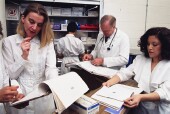 |
 |
 |

U.S. May Soon Face Shortage of General Surgeons
It means people will wait longer for ER treatment, elective procedures, study says|
|
HealthDay
By Robert Preidt
Wednesday, December 10, 2008
 WEDNESDAY, Dec. 10 (HealthDay News) -- There could be a shortage of 1,300 general surgeons in the United States in less than two years, and that shortage could increase to 6,000 by 2050, a new Ohio State University study suggests.
WEDNESDAY, Dec. 10 (HealthDay News) -- There could be a shortage of 1,300 general surgeons in the United States in less than two years, and that shortage could increase to 6,000 by 2050, a new Ohio State University study suggests.
General surgeons often perform lifesaving operations on critically injured or seriously ill patients in emergency departments. A shortage of general surgeons means people will have to wait longer for emergency treatment and elective general surgery.
"People may wait hours in an emergency room if there is a shortage of surgeons. But the problem is that if you're not operated on within a few hours, your disease progresses, and that can create more serious problems in other areas of the body. These are problems that you would not have had with prompt surgical attention," study co-author and retired thoracic and cardiac surgeon Thomas E. Williams, said in an university news release.
Williams and colleagues analyzed data from the U.S. Census Bureau and the American Board of Surgery and calculated the shortage of general surgeons by taking the difference between the number of retiring surgeons and those entering the workforce. That number was then compared to the expected need for general surgeons.
Previous research has shown that 7.53 general surgeons are needed for every 100,000 people to maintain the current level of care.
Currently, there are about 21,500 general surgeons practicing in the United States. About 705 general surgeons die or leave the workforce every year, and about 850 new general surgeons enter the workforce each year. That means there are 145 more general surgeons each year, far less than is needed to match the growing population, the study said.
The study was published in a recent issue of Surgery.
Specialization is part of the problem.
"Many doctors today want to specialize in areas such as vascular, colon or thoracic surgery. They'll train for one or two more years beyond general surgical residency, so they have more professional expertise, and probably won't take the general surgery calls in emergency rooms," Williams said.
HealthDay
Copyright (c) 2008 ScoutNews, LLC. All rights reserved.
Related News:
More News on this Date
Related MedlinePlus Pages:
| Home | Health Topics | Drugs & Supplements | Encyclopedia | Dictionary | News | Directories | Other Resources | |
| Disclaimers | Copyright | Privacy | Accessibility | Quality Guidelines U.S. National Library of Medicine, 8600 Rockville Pike, Bethesda, MD 20894 National Institutes of Health | Department of Health & Human Services |
Date last updated: 11 December 2008 |




